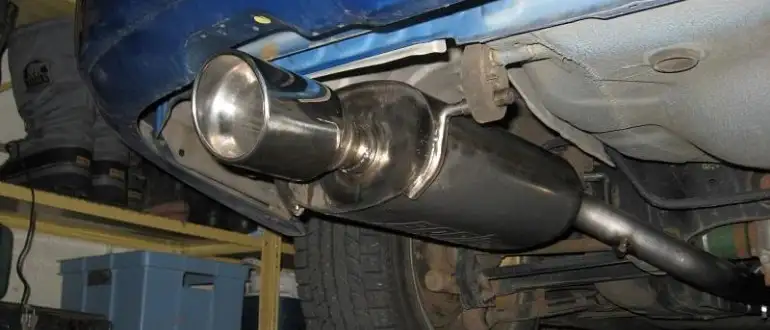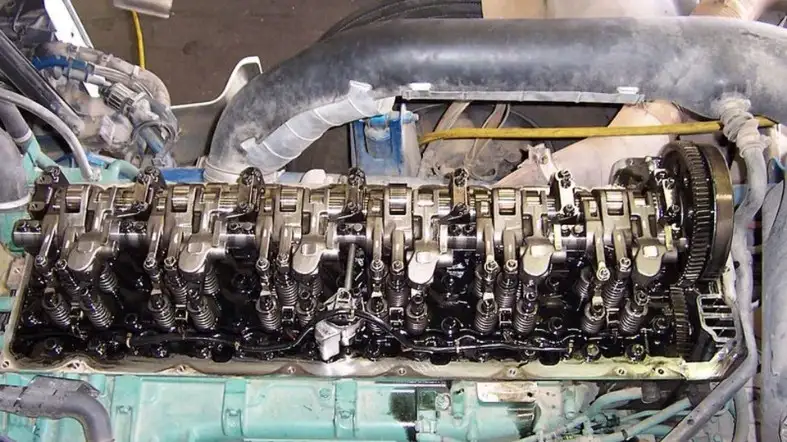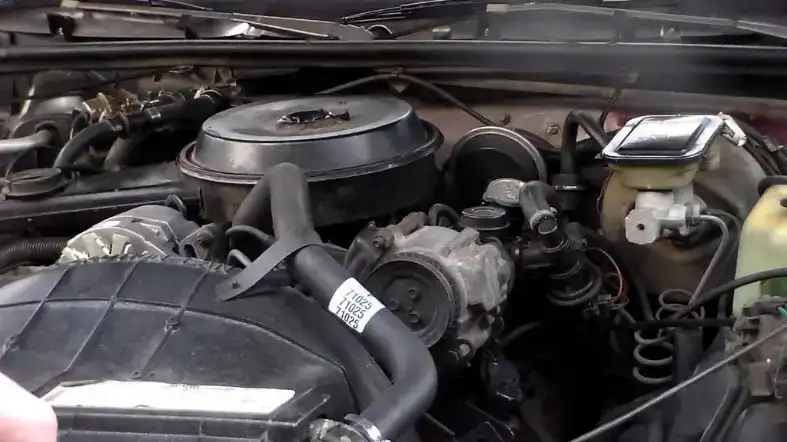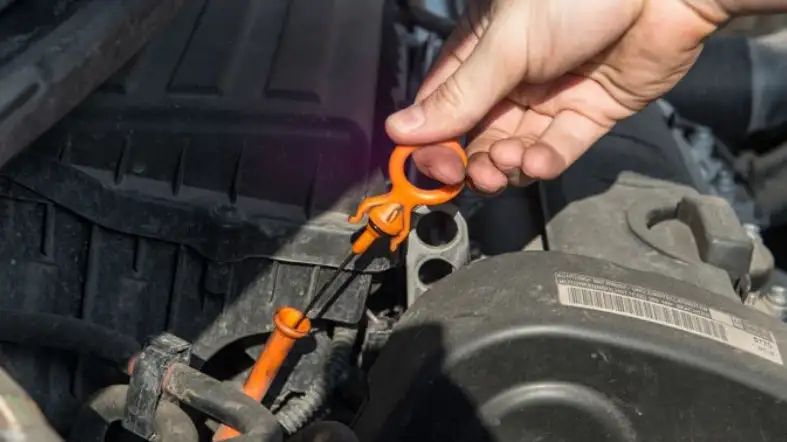If you’ve ever wondered why your engine rattles when you accelerate, you’re not alone. This unsettling noise can be a cause for concern, but fear not!
Here we’ll dive into the reasons behind engine rattling and provide you with solutions to keep your vehicle running smoothly.
Say goodbye to uncertainty and hello to a purring engine.

How Hot Does Engine Oil Get? | Things You Must Know
Why Does My Engine Rattle When I Accelerate?
Loose or Damaged Parts
One of the most common reasons for engine rattling is that some parts are loose or damaged.
This can include bolts, nuts, screws, brackets, hoses, wires, or anything else that holds the engine together.
When these parts are not secured properly, they can move around and hit other parts, creating a rattling noise.
For example, if the exhaust heat shield is loose or cracked, it can rattle against the exhaust pipe when you accelerate.
Another example is if the catalytic converter is bad or clogged, it can rattle inside its housing.
Worn Out Timing Chains
Another possible cause of engine rattling is that the timing chains are worn out or stretched.
The timing chains are responsible for synchronizing the movement of the pistons and valves inside the engine.
They are connected to a tensioner that keeps them tight and centered. However, over time, the timing chains can wear out and lose their tension.
This can cause them to skip or jump over the gears, creating a rattling noise.
If this happens, the engine can lose its timing and performance, and even cause serious damage to the valves and pistons.
Engine Knock
Engine knock is a term that describes the sound of an uncontrolled explosion in the cylinder.
It happens when the fuel-air mixture ignites too early or too late in the combustion cycle. This can cause a shock wave that makes a knocking or pinging noise.
Engine knock can reduce the engine’s power and efficiency, and damage the pistons and cylinders.
Issues with the Exhaust System
The exhaust system is composed of several parts that carry the exhaust gases from the engine to the tailpipe.
These parts include the exhaust manifold, muffler, catalytic converter, oxygen sensor, and pipes.
If any of these parts are damaged, rusted, clogged, or loose, they can cause a rattling noise in the engine.
For example, if the muffler has a hole or crack in it, it can rattle against the pipe or chassis when you accelerate.
Another example is if the oxygen sensor is faulty or dirty, it can affect the fuel-air ratio and cause a rattling noise in the catalytic converter.
Damaged Serpentine Belt
The serpentine belt is a long rubber belt that runs along several pulleys on the front of the engine.
If the serpentine belt is cracked or broken, it can make a rattling noise because it will get loose and hit vital engine components.
The serpentine belt can also slip off its pulleys if they are worn out or misaligned.
Failed Tensioner
The tensioner is a device that keeps the serpentine belt tight and centered on its pulleys.
It consists of a spring-loaded arm and a pulley that moves according to the belt’s tension.
However, over time, the tensioner can fail due to wear and tear or damage. This can cause the serpentine belt to lose its tension and rattle against other parts.
A failed tensioner can also cause premature wear of the serpentine belt and its pulleys.
How Engine Rattle Affects Vehicle Performance
Here are some of the effects of engine rattling on your vehicle:

Increased Fuel Consumption
Engine rattling can increase your fuel consumption because it means that your engine is not running efficiently.
If your car’s engine is loud because of loose or broken parts, worn timing chains, or exhaust problems, it can impact fuel efficiency.
This may lead to incomplete fuel burning, creating harmful substances like carbon monoxide and pollutants in the air.
This can result in incomplete burning of the fuel, which wastes energy and increases emissions.
To compensate for the loss of power, your engine will need more fuel to run at the same speed.
Acceleration and Power Loss
Acceleration and power loss in your car can be caused by engine rattling.
This rattling happens when certain parts of the engine are loose or damaged, such as timing chains or components in the exhaust system.
Another culprit could be engine knock or worn-out parts.
When these issues occur, they can throw off the precise timing and synchronization of the pistons and valves in the engine.
This disruption leads to a decrease in compression and torque, which are essential for the engine to perform at its best.
As a result, your car may struggle to accelerate or maintain speed, especially when driving uphill or on highways.
Transmission Strain
When your car’s engine rattles, it can cause issues with the transmission. This happens because the engine isn’t running smoothly with the transmission.
Rattling noises can be due to loose or damaged parts, worn-out timing chains, engine knocking, or problems with the exhaust system.
The impact is noticeable when shifting gears or driving at low speeds, causing your car to jerk or shudder.
This strain on the transmission components can lead to issues with overall vehicle performance.
Emission Increases
Engine rattling can also increase your emissions because it means that your engine is not burning the fuel cleanly.
If your car’s engine is loud because of loose or broken parts, worn timing chains, or exhaust problems, it can impact fuel efficiency.
This may lead to incomplete fuel burning, creating harmful substances like carbon monoxide and pollutants in the air.
These pollutants can harm the environment and your health, and also trigger the check engine light or fail the emission test.
Knocking and Pinging
If your engine is making a rattling noise, it might lead to knocking and pinging, indicating abnormal combustion.
This happens when parts are loose or damaged, timing chains are worn, or there are issues with the exhaust system.
This affects ignition timing and spark delivery, causing the fuel-air mixture in the cylinder to detonate too early or too late.
This creates a knocking or pinging sound, suggesting potential damage to pistons and cylinders.
It’s essential to address these issues promptly to avoid severe engine damage.
Wear and Tear on Engine Parts
Engine rattling isn’t just a noisy annoyance; it can actually harm your engine over time.
The rattling indicates increased friction and heat, causing wear and tear on essential parts.
Strange sounds in your car can be caused by loose parts, worn-out timing chains, engine knocking, or issues with the exhaust system.
If you hear an unusual noise, it’s essential to get it checked to avoid further problems.
When your engine rattles, it messes with the lubrication and cooling systems of crucial engine parts.
This disruption can result in metal-to-metal contact and overheating, accelerating wear and tear.
Factors Influencing Engine Rattles
Factors that can influence engine rattles are:

Age and Wear of the Vehicle
As your car gets older, some of its parts may wear out or break down. This can cause them to vibrate or move around more than they should, creating a rattling noise.
For example, the timing belt or chain, which controls the movement of the pistons and valves in the engine, can stretch or snap over time.
This can make the engine run poorly and produce a loud rattling sound.
Type of Fuel Used
The type of fuel you use in your car can also affect how your engine sounds.
Some fuels have a higher octane rating than others, which means they can resist knocking or pinging better.
Knocking or pinging is when the fuel-air mixture in the cylinder explodes too early, causing a metallic sound.
This can happen if you use a low-octane fuel in a high-performance engine, or if your engine has carbon deposits that reduce the space in the cylinder.
Maintenance History
How well you take care of your car can also influence how your engine rattles.
If you don’t change your oil regularly, for example, your engine may not get enough lubrication and protection from friction.
This can cause some parts to wear out faster or overheat, resulting in a rattling noise.
If you forget to change your air filter, spark plugs, or other parts when they get dirty or old, your engine might not work well.
It needs these parts to run smoothly. It’s like giving your car a checkup. If you don’t, it might not run as well as it could.
So, make sure to change these things regularly to keep your engine running at its best!
Previous Accidents or Damage
If your car has been involved in an accident or has suffered some damage, it may affect how your engine rattles.
For instance, if your exhaust system has been hit or bent, it may create a rattling noise as the exhaust gases escape through cracks or holes.
Or, if your engine mounts have been damaged, they may not hold the engine securely in place, allowing it to move around and make noise.
Driving Habits and Conditions
How you drive your car and where you drive it can also influence how your engine rattles.
If you drive aggressively, such as accelerating hard, braking hard, or cornering fast, you may put more stress on your engine and its parts.
This can cause them to wear out faster or break down more easily, resulting in a rattling noise.
Also, if you drive on rough roads, such as gravel or dirt roads, you may expose your car to more bumps and vibrations that can loosen or damage some parts.
Quality of Replacement Parts
If you have replaced some parts of your car with aftermarket or low-quality parts, they may not fit well or perform well with your original parts.
This can cause them to rattle or make noise as they interact with each other.
If you put a cheap catalytic converter in your car that doesn’t work well with your emissions system, it might start making a rattling sound.
This happens because it can’t change harmful gases into harmless ones like it’s supposed to.
Engine Design and Manufacturing Quality
Not all engines are created equal. Some are simply better designed and made than others.
Imagine you have two cars, and one engine runs smoother and quieter than the other.
These fancy features help reduce annoying sounds and shaking when the engine is running.
And get this – it’s not just about the bells and whistles. Some engines are crafted with top-notch materials and special methods that make them super tough and reliable.
So, when you hear a car purring quietly down the street, chances are it’s got one of those high-quality, superhero engines inside.
They’re like the rockstars of the car world, making your ride smoother and more enjoyable.
Potential Solutions and Fixes
Here are some of the potential solutions and fixes that you can try.

Regular Maintenance
To maintain a smooth-running engine and prevent rattling, follow your owner’s manual for regular maintenance.
Change oil and filter every 3,000 to 5,000 miles, replace the air filter yearly (more in dusty areas), and change spark plugs every 30,000 miles.
Check tire pressure monthly and stick to recommended service schedules for belts, hoses, fluids, and brakes.
This routine upkeep ensures engine efficiency and minimizes potential issues that could lead to rattling.
Using Higher-Octane Fuel
Another way to prevent and fix engine rattling is to use a higher-octane fuel in your car.
This means using a fuel that has a higher resistance to knocking or pinging, such as premium unleaded or super unleaded.
If your car has a powerful engine or if there’s gunk in the cylinder, use better fuel. It helps engines work well and removes deposits.
By using a higher-octane fuel, you will prevent the fuel-air mixture from exploding too early, and avoid the metallic sound that comes with it.
Tightening Loose Parts
Sometimes, the cause of engine rattling is simply a loose part that needs to be tightened.
This can be anything from a loose bolt or nut, to a loose heat shield or exhaust pipe, to a loose fan blade or belt.
To fix this, you will need to locate the source of the noise and tighten the part with the appropriate tool, such as a wrench, a screwdriver, or a socket.
Be careful not to overtighten the part, as this can cause damage or breakage.
Replacing Worn Out Components
In some cases, the cause of engine rattling is a worn out or broken component that needs to be replaced.
This can be anything from a cracked or broken timing belt or chain, to a damaged or broken catalytic converter, to a faulty or broken engine mount.
To fix this, you will need to remove the old part and install a new one that is compatible with your car and its specifications.
This may require some special tools and skills, so you may want to consult a professional mechanic for this.
Inspect Engine Components
Another way to prevent and fix engine rattling is to inspect your engine components regularly and look for signs of damage or wear.
To keep your car in good shape, remember to check the oil regularly. Look at the dipstick to see if the oil level is okay and if the color is good.
Also, inspect hoses and belts for any leaks or cracks. Listen for strange sounds or vibrations from the engine. These simple checks can help your car run smoothly.
Use an OBD-II scanner to scan for trouble codes. Detecting issues early helps prevent bigger problems and noisy disruptions.
Soundproofing and Vibration Dampening
Finally, one way to reduce the noise from your engine rattling is to add some soundproofing and vibration-dampening materials to your car.
This means installing some insulation or foam under your hood, on your firewall, on your floor, or on your doors.
This will help block out some of the noise and vibration from your engine and make your ride more comfortable and quiet.
FAQs about Rattling Sound While Accelerating
Can engine rattling damage my vehicle’s engine?
Yes, engine rattling can potentially lead to engine damage if left untreated, as it can cause wear and tear on vital engine components.
Is using higher-octane fuel a solution to engine rattling?
Yes, using higher-octane fuel can help prevent engine rattling by reducing the risk of knocking or pinging in the cylinders.
Are there any DIY fixes for engine rattling?
Yes, some DIY fixes include tightening loose parts and inspecting engine components, but it’s essential to consult a professional for accurate diagnosis and repairs.
Do driving habits influence engine rattling?
Yes, aggressive driving habits and rough road conditions can accelerate engine component wear and contribute to engine rattling.
Does a rattling noise always indicate a serious issue?
Not necessarily, but it should be investigated promptly, as even minor rattling can lead to more significant problems if left unattended.
Can I continue driving if my car makes a rattling sound?
It depends on the cause of the rattling. For minor issues, you may be able to drive cautiously, but if it’s alarming or engine-related, it’s best to pull over and have it inspected.
What’s the cost of repairing engine rattling?
The cost varies depending on the underlying issue, ranging from $100 for minor problems to over $500 for extensive repairs. Accurate quotes require professional diagnosis.
Final Thoughts
In conclusion, engine rattling during acceleration can be caused by a variety of issues, including low-octane fuel, worn engine components, loose or damaged belts, clogged fuel filters, exhaust issues, and transmission problems.
If you experience engine rattling during acceleration, it is important to diagnose and address the issue promptly to prevent further damage to your vehicle’s engine and ensure reliable performance.
By following the steps to diagnose engine rattling and seeking professional assistance as needed, you can identify the underlying issue and take appropriate measures to restore your vehicle’s optimal performance and reliability.
